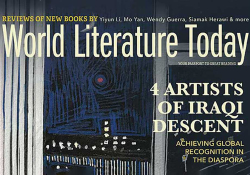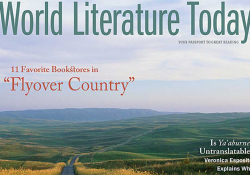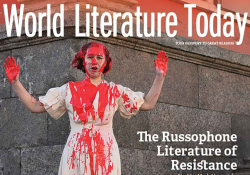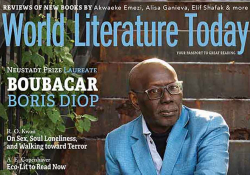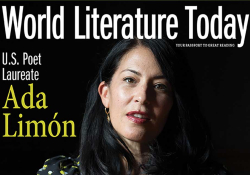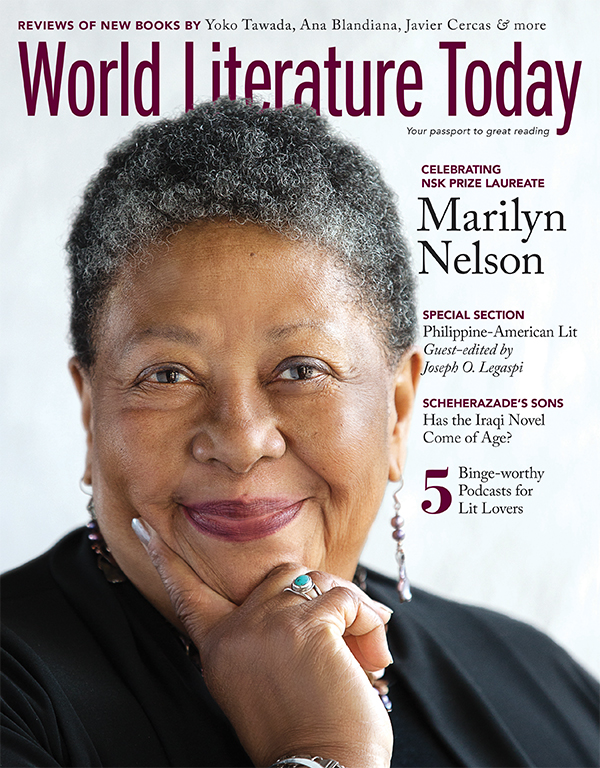Editor’s Note
 Well, Lord, this / infinitesimal speck
Well, Lord, this / infinitesimal speck
could fill the universe with praise.
– Marilyn Nelson, “The Dimensions of the Milky Way”
W
hen Marilyn Nelson delivered her keynote talk, “Bowled Over: A Life with Poems,” at the 2017 Neustadt Festival, the audience in attendance had just seen the premiere of four dance adaptations of her poems from How I Discovered Poetry, Nelson’s 2014 memoir in verse. The dancers who portrayed the young Nelson looking at herself in the mirror in the poem “Thirteen-Year-Old American Negro Girl”—set in 1959 on the western plains of Oklahoma—held up mirrors on the darkened stage, creating a kaleidoscopic effect of not just one bathroom mirror but a multifaceted, incandescent act of reflection. “Give me a message I can give to the world,” says the aspiring writer, “afraid there’s a poet behind [her] face.” From a dusty backwater during the American Cold War, that message has now reached across the globe.
Her message also arcs back in time: in 2009 Nelson wrote a book-length children’s poem called Beautiful Ballerina that features photographs of dancers from the Dance Theatre of Harlem. Arthur Mitchell and Karel Shook founded DTH in 1969, shortly after the assassination of the Reverend Dr. Martin Luther King Jr. fifty years ago this spring, an event that still haunts the nation’s psyche. Mitchell was inspired to start a school that would offer children, especially those in Harlem, the opportunity to learn about dance and the allied arts. Much of Dr. Nelson’s own work as a young writer was inspired by her time in Chicago in the summer of 1966, where—just twenty years old—she heard Dr. King speak, marched for civil rights, and protested against the war in Vietnam. In light of that history, and in the spirit of her collaboration with the Dance Theatre of Harlem, it seemed most fitting that we were able to witness her own poetry performed on stage.
And given the many students in the audience that morning, Nelson’s lifelong commitment to teaching likewise seems worthy of note. Her grandmother taught at the Creek-Seminole College in Okfuskee County, Oklahoma, in the early 1900s, and her mother taught at military bases around the country in the mid-twentieth century, so she is a third-generation teacher. Nelson credits Miss Jackson, her seventh-grade teacher in Fort Worth, Texas, with encouraging her to read African American poetry, which no doubt inspired her to think about becoming a writer. In many ways, poets and teachers help us to be better readers of the human condition. In the special section about her life and work beginning on page 52, Nelson’s own lifelong commitment to teaching shines through.
Moreover, Nelson’s Oklahoma connections in many ways reflect, in microcosm, much of the broader sweep of twentieth-century American history. While much has changed in the state since 1959, many of the social, cultural, and political issues addressed in Nelson’s work have not. At a panel devoted to her work during the festival, the participants focused on her book A Wreath for Emmett Till (2005) and the 1921 Tulsa Race Riot, but despite slavery, despite Jim Crow, despite race riots, and despite lynchings, there are triumphant stories of individual heroism and collective survival in Oklahoma’s African American history reflected in the broader themes of Nelson’s poetry. Melvin Tolson and Ralph Ellison in literature, Charlie Christian and Leona Mitchell in music, Clara Luper and George Henderson in civil rights: the African American cultural, literary, and activist legacy of the state should be a source of great pride to the country as a whole, and the spirit of that legacy can be found in the poetry of Marilyn Nelson. And while many of her poems describe our “limitless capacity to do the worst we can conceive,” so many others are praise-songs, poems of awe, enchantment, and reverence.
To fill the universe with praise. Can you think of a better vocation?
Daniel Simon

